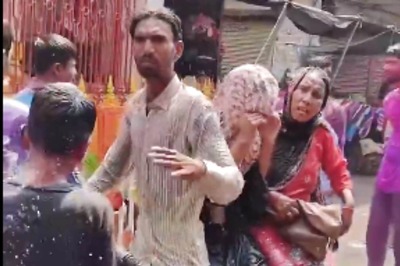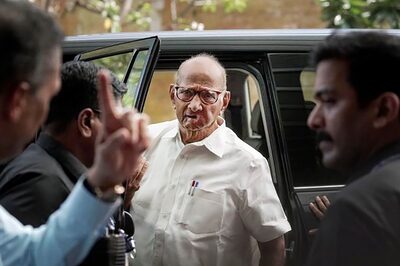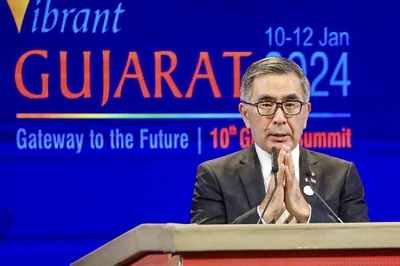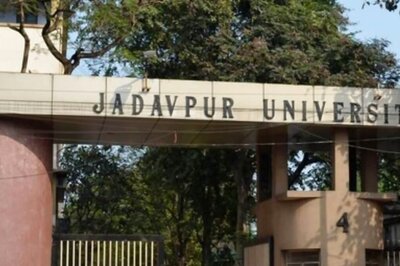
views
Unlike most political leaders, Atal Bihari Vajpayee was never in a hurry — to grab power or retain it. His ability to bide his time endeared him to his partymen as much to the allies of the BJP who found him in a “father-figure” — rather than an ambitious politician who wanted to override them.
Former prime minister Atal Bihari Vajpayee passes away aged 93. Follow Live Updates here.
So much so, his capacity to swallow his pride to handle tantrums of recalcitrant leaders like Jayalalithaa and Mamata Banerjee was unmatched.
When they deserted him, Vajpayee held no bitterness against them. A quintessential coalition architect, Vajpayee knew the power and eloquence of silence, and had the benefit of an understanding heart.
His silence was his shield as well as his way of keeping the door open for a future rapprochement. And his one-liners were the mantra for running coalitions.
Unlike Prime Minister Narendra Modi who singularly worked to win a decisive mandate for the BJP in 2014 to justify his “impatience” to usher in changes, Vajpayee’s ride was not so easy.
Vajpayee had one goal to deliver to his political fraternity. He wanted to ensure that he achieved the record of being the first BJP PM to complete five years. The BJP had never been so close to the corridors of power in Delhi.
The contrast was inevitable. If Modi sweated like a dream selling machine to win a handsome mandate, Vajpayee sweated to perfect the art of managing contradictions in a political alliance in a coalition era.
Vajpayee was witness to the workings of the prime ministership of India — right from the days of Jawaharalal Nehru to Indira Gandhi to Morarji Desai to Charan Singh, then again back to Indira Gandhi, then on to Rajiv Gandhi, V P Singh, Chandra Shekhar and P V Narasimha Rao before his turn came.
His first unsuccessful bid in 1996 for the top slot happened when the BJP emerged as the single largest party. His stature did not win political friends because the 1992 demolition of the Babri Masjid had left the BJP rather “untouchable” because of the fear of losing minority votes in the event of any tie-up.
The 1996 bid gave Vajpayee wisdom and insight, which came to his use two years later. Moderation was the key to governing India when one does not have enough numbers in Parliament to push own agenda.
Never bitter that his first tenure lasted only 13 days, Vajpayee was open to possibilities —with a core belief that “everything happens for good.”
That view came handy for him when he faced his most momentous period, which was also his most challenging years, in 1998.
Any other Indian politician in his boots would have hung his Nehru jacket— but not Vajpayee who virtually personified a mountain of patience.
The Lok Sabha polls were held in 1998 after the collapse of the Inder Kumar Gujral government following the Congress withdrawing support because it refused to drop the DMK ministers named in a probe connected to Rajiv Gandhi’s assassination for suspected links to the separatist Tamil Tigers or the LTTE.
The results threw up a Hung House: The BJP secured 182 seats. Vajpayee’s chances of becoming PM again brightened after Jayalalithaa’s AIADMK, which secured 18 seats, offered support to take the figure, along with other allies, past the half-way mark in the 545-member House.
But for Vajpayee and for most BJP leaders, Jayalalithaa was an untested new friend, and the lessons came in tsunami style.
On March 12, 1998, when other allies of the BJP readily furnished the letter of support to Vajpayee, which was to be sent to the President for seeking an invitation to form the government, Jayalalithaa held back hers.
This gave a heartache to the BJP. She refused to do business with BJP leader Pramod Mahajan who went to meet her as Vajpayee’s personal and political emissary.
During a discussion on the NDA government’s agenda, Ramakrishna Hegde (who was in the NDA by then) disagreed with her demand for Tamil to be declared an official language. So she decided to hold back her letter!
A harassed Vajpayee tried to use his gentle persuasion. But his show of patience did not go down with other coalition partners and even BJP colleagues felt he was too mild with her tantrums.
Vajpayee sent soft-spoken Jaswant Singh who managed to persuade her but not before she had bargained her way into three cabinet berths and three other ministerships.
As his government bumbled its way, Jayalalithaa’s real demand was that the Centre withdraw disproportionate cases (filed against her when P Chidambaram was the Finance Minister between 1996 and 1998 when Deve Gowda and I K Gujral were PMs).
After assuming office in 1996, the Karunanidhi government in Tamil Nadu had slapped as many as eight cases of corruption against Jayalalithaa. In one of the more serious cases involving purchase of TV sets during her chief ministership, Jayalalithaa was arrested and jailed for a month in December 1996.
Ever willing to accommodate, Vajpayee realised that he could order withdrawal of cases against her or accede to her demand for dismissal of the DMK regime in Tamil Nadu. Jayalalalithaa withdrew support, which was a slap on the face for Vajpayee personally.
In a vote of confidence, Vajpayee lost the motion by one vote and his government fell within 13 months of having taken over.
An old beta noire of Vajpayee since the days of the Morarji Desai government, Subramanian Swamy played a crucial role in getting her to revolt against his government.
Swamy, who is today a BJP MP, arranged for Jayalalithaa's meeting with Congress president Sonia Gandhi over a tea party in Hotel Ashoka in Delhi’s Chanakyapuri, which led to a new political scenario.
Vajpayee silently bore the humiliation heaped by Jayalalithaa, letting other BJP leaders do the talking.
Her exit, however, saw the immediate entry of Jayalalithaa’s arch rival, the DMK though its chief M Karunanidhi could never stand the BJP’s Hindutva.
Getting Vajpayee’s consent, Pramod Mahajan got Karunanidhi’s nephew and aide Murasoli Maran to work on Karunanidhi who agreed to back Vajpayee.
The 1999 Lok Sabha polls, which were held a few months after the Kargil war, saw Vajpayee back in the saddle with a more stable coalition.
With Jayalalithaa gone, it was then turn of Trinamool Congress leader Mamata Banerjee to fill her place when it came to show recalcitrance.
Vajpayee could never understand the ways of Mamata who had broken away the Congress in 1998 because she thought it was too close to the CPI (M) and would never allow her to dislodge it from power in West Bengal.
Known for her mercurial ways during P V Narasimha Rao’s tenure as PM, Mamata was inducted by Vajpayee as a Cabinet minister in 1999. A restless Mamata and her party colleague Ajit Panja resigned in protest against the petrol and diesel prices in 2000. Subsequently, she withdrew her resignation. Vajpayee took the brunt of the episode as his government again began to look vulnerable.
A year later, a Tehelka sting sought to damage George Fernandes, who was Defence Minister, by showing professed arms dealers could get access to his aide Jaya Jaitley, Mamata used the occasion to quit the NDA by citing “corruption cases” against the senior ministers.
Vajpayee stood by Fernandes and let Mamata go. For he knew her real reason. She wanted to align with the Congress in the Bengal polls in 2001, which her fledgling party could not win as the Marxists remained very formidable.
An understanding Vajpayee did not mind her return in January 2004 as Coal Minister.
Then it was turn of the DMK. Karunanidhi realised that the 2004 polls would not see Vajpayee in a lead role because of his failing health. The Dravidian stalwart was an easy ally for Vajpayee unlike Jayalalithaa. But Karunanidhi could never reconcile with the idea of working with Advani if he replaced Vajpayee post-2004 polls. His nephew and go-between Murasoli Maran falling ill and finally passing away after being in coma for some months in November 2003, Karunanidhi made up his mind to part ways with Vajpayee in December 2003.
Karunanidhi’s parting shot was a compliment for Vajpayee. He could not think of working with any other BJP leader as a “BJP without Vajpayee would be a different party.” Karunanidhi’s real fears were that the DMK stood to lose the votes of Muslims and other minorities in Tamil Nadu if they perceived to be working for Advani to become PM.
An account of relationship of Vajpayee’s allies with him would not be complete without the Telugu Desam Party (TDP) head and Andhra Pradesh Chief Minister N Chandrababu Naidu. Naidu was the most influential ally of the NDA.
Even though the Lok Sabha polls were not due before October 2004 (as the Kargil War had delayed holding of the 1999 elections), Naidu pressed for advancing them so that they could be held along with the state elections — an idea that found support from L K Advani who was Deputy PM. The previous AP polls in 1999 had been held along with the Lok Sabha polls.
Vajpayee did not like the idea of advancing the Lok Sabha elections.
Advani and Pramod Mahajan, however, found merit in Naidu”s contention that a “Vajpayee versus Sonia Gandhi” fight would benefit him and the BJP too.
A Naxalite attack on Naidu in October 2003 hastened matters and found Vajpayee again coming under pressure from Advani.
Vajpayee found himself forced into a gamble that proved to a political misadventure. Vajpayee had his term curtailed but the BJP, and the TDP too, lost the elections to the Lok Sabha as well as the Andhra Pradesh polls.
Despite his initial political instinct going against the demands of the NDA allies, Vajpayee did not hesitate to implement what he preached: the dharma of coalition and paid a price.
In the process, Vajpayee endeared himself to them all. Today, if Mamata or Chandrababu or even the Shiv Sena see a great personage in Vajpayee, it is because of this reason.
Both in words and spirit, Vajpayee put the interests of the allies of the NDA before himself or even his own party — even if some BJP leaders were upset on this account. True greatness lies somewhere in balancing the interests of self and larger political payouts and dignity of everyone concerned. Vajpayee preferred the latter.
(Shekhar Iyer is former senior associate editor of Hindustan Times and political editor of Deccan Herald. Views expressed are personal)




















Comments
0 comment